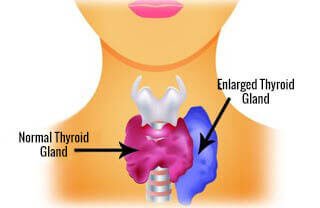How Does Thyroid Disease Affect Your Body?


Reviewed and approved by the doctor José Gerardo Rosciano Paganelli
There are many factors that can impact the health of your thyroid gland and cause illness. The two main types of thyroid disease are hypothyroidism and hyperthyroidism. They both have a different impact on the body, but either way, you have to get treatment so thyroid disease won’t affect your quality of life.
You might like: 5 Thyroid Treatments You Can Do at Home
Hypothyroidism

The way hypothyroidism affects the body is case by case and depends on how far it has progressed. Here are some of the things that happen:
- Exhaustion or weakness
- Weight gain or obesity
- Lack of appetite
- Changes to the menstrual cycle
- Lack of sexual desire
- Feeling cold
- Constipation
- Muscle aches
- Swelling around the eyes
- Brittle nails
- Hair loss
You might like: How to Use Celery to Alleviate Constipation
Hypothyroidism is the most common thyroid disease and mainly affects women. Along with the symptoms mentioned above, it can also cause dry skin, poor memory, and problems concentrating. In severe cases, it can cause deterioration in the function of the heart, kidneys, and liver.
Regardless of how serious it is, it’s very important to see your doctor and seek treatment.
Hyperthyroidism

Like hypothyroidism, the way it impacts the body is case by case and the symptoms depend on the stage of the disease. Symptoms of hyperthyroidism include:
- Exhaustion
- Weight loss
- Nervousness
- Accelerated heart rate
- Increased perspiration
- Feeling hot
- Changes in the menstrual cycle
- More frequent bowel movements
- Tremors
In some cases, people with hyperthyroidism will also experience symptoms like fever, accelerated heart rate, or changes in mental functioning (confusion, convulsions, restlessness, and coma).
Thyroid disease and quality of life

Whichever thyroid disease you have, it’s extremely important to see your doctor for diagnosis and treatment. Thyroid disease gradually starts to interfere with your life, until it begins to seriously affect your health and prevent you from going through your normal daily routine.
With hypothyroidism, it’s very important to completely change your habits and adopt a healthy lifestyle to keep the disease under control, especially when it comes to weight gain. So, proper nutrition and a healthy diet play a major role in treating it.
Hyperthyroidism requires a special diet from a nutritionist that will limit iodine intake, which the thyroid gland uses to manufacture hormones.
Moreover, thyroid specialists warn that there is no concrete way to prevent either type of thyroid disease. However, they insist that a balanced diet, exercise, and healthy habits can be an important factor in reducing the risk of thyroid problems in the future.
Once thyroid disease is diagnosed, it’s important to follow your doctor’s recommendations to prevent serious changes in the body.
All cited sources were thoroughly reviewed by our team to ensure their quality, reliability, currency, and validity. The bibliography of this article was considered reliable and of academic or scientific accuracy.
- N. Brandan; I. Llanos; A. Rodríguez. (2010). Hormonas Tiroideas. Universidad Nacional Del Nordeste. https://doi.org/10.1089/thy.2007.0257
- Toribio, R. E., & Duckett, W. Μ. (2004). Glándula tiroides. Medicina Interna Equina, Vol. 2.
- Ares Segura, S., Quero Jiménez, J., & Morreale de Escobar, G. (2009). Enfermedades frecuentes del tiroides en la infancia. Pediatría Atención Primaria. https://doi.org/10.4321/S1139-76322009000600005
- Ángeles, M. (2016). Estructura y función de la glándula tiroides. Revista ORL, 7, 7-16. http://revistas.usal.es/index.php/2444-7986/article/download/orl20167s2.14724/15362
- Frías López, M., Tárraga López, P. J., Rodríguez Montes, J. A., Solera Albero, J., Celada Rodríguez, Á., Cara, L., & Gálvez, A. (2011). Hipotiroidismo subclínico y factores de riesgo cardiovascular. Nutrición Hospitalaria, 26(6), 1355-1362. http://scielo.isciii.es/scielo.php?script=sci_arttext&pid=S0212-16112011000600024
- Reid, J. R., & Wheeler, S. F. (2005). Hyperthyroidism: diagnosis and treatment. Am Fam Physician, 72(4), 623-30. https://pdfs.semanticscholar.org/f77e/d523bed5c504859af57d168192ed0135e9df.pdf
- Ruíz, F., & Yareth, T. (2015). Causas del hipotiroidismo relacionadas con el estilo de vida (Doctoral dissertation, Facultad en Ciencias de la Nutrición y Alimentos-Licenciatura en Nutriología-UNICACH). https://repositorio.unicach.mx/bitstream/20.500.12114/329/1/NUT%20616.444%20F84C%202015.pdf
- Endocrinólogo, J. H. M. M., T4T, A. T. T., T3T, T. T., T4L, B. T. L., T3L, T. L., TSH, C. T., … & RET, P. O. (2006). Guía de consenso para el diagnóstico y seguimiento de la enfermedad tiroidea. Acta Bioquímica Clínica Latinoamericana, 40(3), 399-418. https://www.redalyc.org/pdf/535/53540314.pdf
This text is provided for informational purposes only and does not replace consultation with a professional. If in doubt, consult your specialist.








